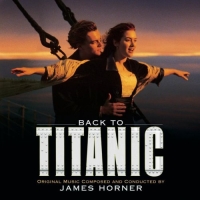This page is based on this
Wikipedia article Text is available under the
CC BY-SA 4.0 license; additional terms may apply.
Images, videos and audio are available under their respective licenses.
Ragtime – also spelled rag-time or rag time – is a musical style that enjoyed its peak popularity between 1895 and 1918. Its cardinal trait is its syncopated or "ragged" rhythm.

Irving Berlin was an American composer and lyricist, widely considered one of the greatest songwriters in American history. His music forms a great part of the Great American Songbook. Born in Imperial Russia, Berlin arrived in the United States at the age of five. He published his first song, "Marie from Sunny Italy", in 1907, receiving 33 cents for the publishing rights, and had his first major international hit, "Alexander's Ragtime Band" in 1911. He also was an owner of the Music Box Theatre on Broadway. It is commonly believed that Berlin could not read sheet music, and was such a limited piano player that he could only play in the key of F-sharp unless using his custom piano equipped with a transposing lever.

James Hubert Blake, known as Eubie Blake, was an American composer, lyricist, and pianist of ragtime, jazz, and popular music. In 1921, he and his long-time collaborator Noble Sissle wrote Shuffle Along, one of the first Broadway musicals to be written and directed by African Americans. Blake's compositions included such hits as "Bandana Days", "Charleston Rag", "Love Will Find a Way", "Memories of You" and "I'm Just Wild About Harry". The musical Eubie!, which opened on Broadway in 1978, featured his works.

Randall Stuart Newman is an American singer-songwriter, arranger, composer, and pianist who is known for his distinctive voice, mordant pop songs, and for film scores.

Eugene Delbert Greene was an American vaudeville and ragtime singer. He was one of the first to use scat singing techniques.
Alex "King" Watzke (1872-1919) was a violinist and bandleader in New Orleans, Louisiana. His band enjoyed fair popularity ca. 1900-1911 or later. The band played ragtime, popular music, and possibly an early or ancestral version of what later became known as jazz. By 1904 Watzke's band's repertory included an early version of what later became known as "Tiger Rag" or a similar melody; he and his band called it "Number 2" as Watzke's practice was to refer to his compositions by number. As this appears to be the earliest dated reference to "Tiger Rag", many believe Watzke's claim to have been its composer.
"Heat Wave" is a popular song written by Irving Berlin for the 1933 musical As Thousands Cheer, and introduced in the show by Ethel Waters.

"Ragtime Cowboy Joe" is a popular song. The lyrics were written by Grant Clarke and the music was composed by Lewis F. Muir and Maurice Abrahams. It was copyrighted and published in 1912 by F.A. Mills.
Ryo Ishibashi is a Japanese actor and lead singer of the Japanese rock band ARB. He is known around the world for his roles in the Japanese horror films Suicide Club and Audition. He is also recognized in America for his role as Nakagawa in The Grudge and The Grudge 2.

Back to Titanic is the second soundtrack album released for the film, which contains a mixture of previously unreleased recordings and newly recorded performances of the songs in the film.
"Easter Parade" is a popular song, written by Irving Berlin and published in 1933. Berlin originally wrote the melody in 1917, under the title "Smile and Show Your Dimple", as a "cheer up" song for a girl whose man has gone off to fight in World War I. A recording of "Smile and Show Your Dimple" by Sam Ash enjoyed modest success in 1918. Berlin resurrected it with modifications and new lyrics for the 1933 revue As Thousands Cheer.
"Now It Can Be Told" is a popular song written by Irving Berlin for the 1938 film Alexander's Ragtime Band, where it was introduced by Alice Faye and Don Ameche. It was nominated for an Academy Award in 1938 but lost out to "Thanks for the Memory".

"That International Rag" is a song composed by Irving Berlin in 1913. Berlin wrote the song the night before its debut, when he needed a new opening number for his act while on tour in England.
Bernard Herzbrun was an American art director. He was nominated an Academy Award in the category Best Art Direction for the film Alexander's Ragtime Band. He worked on 275 films between 1930 and 1955. He was born in New York City, New York and died in Los Angeles, California.

Slow Beau is a short animated film distributed by Columbia Pictures, starring Krazy Kat. The film also marks the debut of Krazy's second theme song which would have a much longer run than his first.

"When Alexander Takes His Ragtime Band to France" is a World War I era song written by Alfred Bryan, Cliff Hess, and Edgar Leslie in 1918. The song was performed by Marion Harris and released as a single by Victor Records in June 1918.
Bing Crosby Sings with Al Jolson, Bob Hope, Dick Haymes and the Andrews Sisters is a Bing Crosby Decca Records studio 78rpm album of phonograph records featuring Crosby with several of Decca's top artists.










